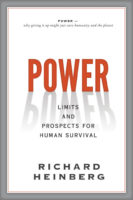 This is an abridged excerpt from Power: Limits and Prospects for Human Survival (2021) by Richard Heinberg; posted with permission from New Society Publishers.
This is an abridged excerpt from Power: Limits and Prospects for Human Survival (2021) by Richard Heinberg; posted with permission from New Society Publishers.Read more in this series.
Pathologies of Power
Metaphorically speaking, power is a psychosocial drug, analogous in some ways to cocaine or methamphetamine. Some people appear to be more innately inclined toward power addiction; for them, power can be irresistible and the loss of it intolerable. Some addicts get their fix merely by being in the presence of power, or by serving those who have it with obsequious enthusiasm. Others scrabble for any vestige of power they can achieve, whether wealth or position, and wear it as a badge of self-worth.
Our bodies and brains are shaped by rank and status. We use a lot of brain power in continually judging the place of every person in our immediate environment in terms of power hierarchies. Having a low self-perceived place on the totem pole can result in lower long-term levels of health and cognitive ability.
Having higher social status can also be debilitating, though in different ways. Dacher Keltner, a psychology professor at UC Berkeley, found through lab and field experiments that subjects who enjoyed vertical social power acted as though they had suffered a traumatic brain injury: they were more impulsive, less aware of risks, and less adept at seeing things from other people’s point of view. Sukhvinder Obhi, a neuroscientist at McMaster University who studies brains rather than behavior, found something similar. When Obhi viewed the brains of more-powerful and less-powerful individuals using a transcranial magnetic-stimulation machine, he found that power seemed to impair a neural process called “mirroring,” which is foundational to the experience of empathy. Keltner points to what he terms the “power paradox”: a person with power eventually tends to lose some of the capacities that were needed to obtain that power in the first place.
Biological evolution sensitized us to differences of status; cultural evolution resulted in an enormous widening of variation in status. My tiny flock of four hens spend a great deal of their time establishing and reinforcing a pecking order. Chickens are social animals, and, like chimps, wolves, and other social creatures, they insist on having a clear hierarchy. Mimi, who is a big and beautiful hen, happens to occupy the lowest rung on our flock’s ladder of social power. Any of the other three hens may peck her on the back of the head, sometimes to discourage her from eating the tastiest morsel available, other times just because. Mimi is not as happy or confident a chicken as Buffy, who’s at the top of the ladder. But what Mimi has to put up with is minor compared to the indignity and suffering that humans heap upon one another in the name of status and power.
Humans in modern societies exist in multiple overlapping hierarchies, and we have to navigate our way through all of them more or less simultaneously. We tend to minimize (if we can) our participation in those hierarchies in which we feel disempowered, while we overvalue those hierarchies in which we excel.
Every institution that’s characterized by vertical power is populated with many members who merely wish to make their way in the world, but it will also likely contain a few who are pathological power addicts and power enablers. Unfortunately, such power structures often reward the power addicts, who quickly learn to make, use, or abuse rules to their advantage. Power addicts may wield their advantages to gain sexual favors or to impose upon those they find sexually desirable; or to profit from and take credit for the efforts of others. Organizations often eventually learn the corroding effects of power addiction and create mechanisms of accountability; however, as long as vertical power structures remain in place within organizations, the tension between power-seeking and its pathologies, on one hand, and means of power restraint, on the other, tends to persist or return.
Those who crave power often prop themselves up by putting others down. Racism and sexism are common reflexes of the pathological power-seeker. Those with more power rationalize unfair and even reprehensible behavior toward those with less by assuming or asserting that the powerless are lazy, corrupt, incapable, unintelligent, or otherwise undeserving.
Due to evolutionary and historical factors discussed in chapters 1 and 2, men (rather than women) have generally tended to be the designers and beneficiaries of vertical power systems, and men also tend disproportionately to exhibit pathologies of power. In addition, for centuries, Europeans—as colonizers, settlers, soldiers, businessmen, and missionaries—used technological and economic advantages to overpower others in much of the rest of the world; today their descendants frequently exhibit characteristics and behaviors typical of the over-empowered. One of those characteristics is a sense of entitlement—an unrealistic and unmerited expectation of desirable living conditions and favorable treatment at the hands of others. Moreover, most of humanity has recently adopted an attitude of entitlement vis-à-vis the rest of the natural world as a result of its access to the power of fossil fuels (as we will see in Chapter 4).
There is a clear correlation between physical power and vertical social power. Physical power can derive simply from being larger, more muscular, or more aggressive; it can also arise as a result of the possession of weapons, or the ability to command others who are skilled in the use of violence. Access to energy sources—from animal or human muscle-power to the ability to harness electricity—is still another source of physical power, which is often mediated by money—the currency of power. Such physical power confers social power, which, as it grows, tends to become more vertical than horizontal.
Threats to power provoke predictable responses in individuals and whole societies, including anger and aggression, defenses and defensiveness, and projection—the attribution to others of one’s own unacknowledged and undesirable characteristics, feelings, or behaviors.
Of course, the psychology of power has a flipside: the psychology of powerlessness. The powerless and the disempowered have an increased tendency to feel humiliation and shame, submission and subservience, and exhibit a hesitancy to act. However, feelings of powerlessness can also have paradoxical manifestations in narcissistic personality disorder, hostility, and aggression. All of these responses and tendencies can have intergenerational impacts.
Whether in family, school, work, or politics, we’re all immersed in the pathologies of power. If we’re lucky, we learn to navigate these waters without being harmed irreparably, and without harming others. Many are not so fortunate.
Read more in this series.
Teaser photo credit: Photo by Serge Kutuzov on Unsplash






